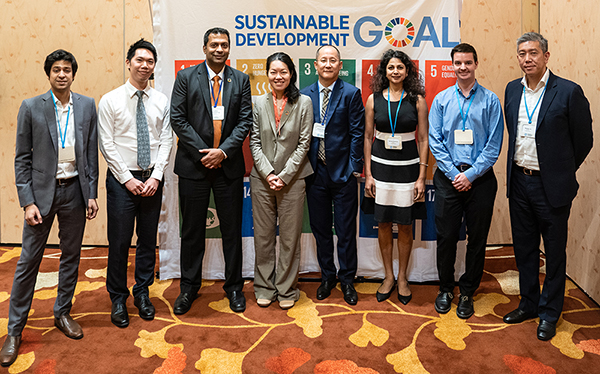November 5 2018, Bangkok – In a bid to scale up climate action with the private sector, the United Nations Development Programme (UNDP) has initiated a compact with eight leading businesses with operations in Asia. Forged at the regional Responsible Business Forum in Singapore, the agreement sees Blockscale Solutions, City Developments Limited, PhilanthropyWorks, SCOR, Singtel, Swiss Re, The Weather Company (IBM) and Yeti Airlines pledge to collaborate around the generation, analysis, dissemination and use of climate intelligence to support climate action.
A shortage of reliable data and knowledge about projected climate change impacts on key sectors – as well as the likely rate of return of investments in climate resilience – inhibits investment decisions within the private sector. This is particularly the case for micro, small and medium-sized enterprises (MSMEs) which comprise the backbone of most developing economies.
“This new compact is a compelling step towards filling the gaps and identifying areas for collaboration in climate resilience,” said Pradeep Kurukulasuriya, Head of Climate Change Adaptation and Executive Coordinator a.i. Global Environment Finance Unit at UNDP. “There are many entry points for private sector involvement in the climate information services value chain. It’s a win-win: through public-private partnerships we can support more informed investment decisions, raise return on investment and enhance sustainable development.”
Discussions at the Responsible Business Forum highlighted three areas for potential collaboration: advancing the generation, collection and analysis of data for decision-making; increasing the availability of climate information and advisory services, for sectors from agriculture and water through to insurance and aviation; and raising awareness to scale up adoption of initiatives around climate action.
“This is a significant step and we are honoured to play a role in the Compact partnership,” said Chami Akmeemana, CEO of Blockscale Solutions. “Data or general research alone will not incentivise the private sector to make the significant investments needed for various resiliency initiatives. However, with this initiative we will be able to curate and package insights that are more meaningful and actionable, thereby providing a much clearer platform for the private sector to make informed and impactful decisions.”
Over the next few months, UNDP will reach out to compact partners to establish concrete entry points for collaboration, both within the context of UNDP’s climate action programming and beyond.

***
About the UN Development Programme
UNDP partners with people at all levels of society to help build nations that can withstand crisis, and drive and sustain the kind of growth that improves the quality of life for everyone. On the ground in nearly 170 countries and territories, we offer global perspective and local insight to help empower lives and build resilient nations.
In line with the UN Secretary General's reform agenda and the guidance of Member States, UNDP’s Strategic Plan 2018-2021 sets out new ways of working to deliver on UNDP's vision: Helping countries to eradicate extreme poverty, supporting them to quickly modernize key sectors to work better for sustainable development, and enabling them to prevent crisis and recover faster. The Strategic Plan focuses on integrated solutions under six key areas: poverty, governance, resilience, environment, energy, gender equality.
Shovon Kibria, Private Sector Engagement Specialist, UNDP Bangkok Regional Hub Shovon.Kibria@undp.org
